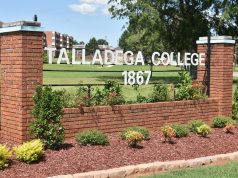By Yvonne Taunton
UAB News
After a week of interviews in legislative offices on Capitol Hill, Sandra Cutts, a University of Alabama at Birmingham School of Engineering doctoral candidate, has been selected as one of 60 students to be a 2019 John A. Knauss Marine Policy fellow.
Cutts is also one of only 14 of those students selected for a post in a legislative office for a one-year period. Cutts’ one-year fellowship in the highly competitive program begins this month in Mississippi’s U.S. Sen. Cindy Hyde-Smith’s office in Washington, D.C. There, Cutts will gain a unique educational and professional experience in ocean, coastal and Great Lakes resources, and in the national policy decisions affecting those valuable water resources.
“Initially, I was funding my own graduate education here at UAB; but my adviser, Dr. Robert Peters, frequently notified his graduate students concerning funding, educational and personal growth opportunities,” Cutts said. “I received this fellowship opportunity from Dr. Peters, applied for the competitive NOAA Sea Grant and was selected to receive a one-year position as a Legislative Knauss fellow. I am excited to be part of the program and work in Sen. Cindy Hyde-Smith’s office to address issues in the Southern region and problems impacting the nation.”
The nationally recognized fellowship requires candidates to provide credentials and address questions related to the interest and desires to mitigate the damage to the Earth, particularly the environment and oceans.
“Sandra has had a keen interest and awareness in environmental public policy, so the Sea Grant Knauss fellowship provides her with an excellent opportunity to be involved with congressional policies and activities, which should be an asset to her professional growth and development,” said Robert Peters, Ph.D., professor of environmental engineering for UAB’s Department of Civil, Construction and Environmental Engineering.
As a doctoral student in environmental engineering, Cutts has studied properties that face redevelopment or reuse issues because they contain — or are perceived to contain — pollutants or contaminants. She is looking at redeveloped sites for trends and characteristics that could ultimately encourage stakeholder investment in cleaning up these sites, known as brownfields.
In addition to her coursework, she has been an intern with the U.S. Environmental Protection Agency, General Services Administration, U.S. Army Corps of Engineers and the Department of Energy’s Savannah River site. Cutts also performed environmental research in Africa, where she investigated the use of solar panels in Saharan areas.
Cutts says she has taken full advantage of graduate programs available at UAB, some of which she says helped her during the Knauss Grant application and interview process.
Lori McMahon, Ph.D., dean of the UAB Graduate School, encouraged Cutts to participate in UAB’s Three Minute Thesis competition. It gave Cutts an opportunity to refine her research topic — redeveloping former contaminated or perceived contaminated properties known as brownfields — and articulate scientific concepts concisely so they could be understandable to the general public and relatable to municipalities across the United States.
The relevance and importance of Cutts, environmental and human health research — and its potential societal impact — made her interviewers excited and, ultimately, solidified her selection.
Gaining policy insight
Working as a legislative fellow will provide Cutts with policy insight. Involvement in this process will give her the opportunity to shape the direction and type of research that would ultimately assist national policy and address and resolve constituent concerns.
“Her involvement will benefit both Mississippi and Alabama, under the coordination of the Mississippi-Alabama Sea Grant Consortium, which selected Sandra as its Knauss Marine Policy fellow,” Peters said.
“She will also benefit from this experience on her dissertation activities. The primary objective of her dissertation research is to investigate the likelihood of brownfield redevelopments in the United States and the factors influencing successful redevelopment, such as previous land use, current land use, type of contaminant and remediation activity. Then she will determine the likelihood of a successful brownfield redevelopment using statistical analyses.”
Hyde-Smith says she is excited to have Cutts on her staff.
“Sandra will have an opportunity to provide input in legislative and policy matters related to preserving Mississippi’s abundant natural resources,” Hyde-Smith said.
Cutts hopes to learn how policy and science intersect, the procedures and implementation of environmental legislation, and how scientific research can have an impact on policy.
The Mississippi-Alabama Sea Grant Consortium endorsed Cutts’ application, and she was the only applicant in Alabama or Mississippi to be selected as a fellow.
The Fellowship is named after John A. Knauss, one of the National Sea Grant’s founders and former NOAA administrator. The fellowship matches highly qualified graduate students with hosts in the legislative and executive branch of government in Washington, D.C. The National Sea Grant College Program has administered the fellowship program since 1979 and has since placed more than 1,200 early-career professionals in government offices and agencies in Washington, D.C., to work as science advisers.





